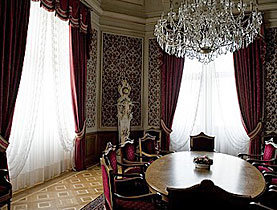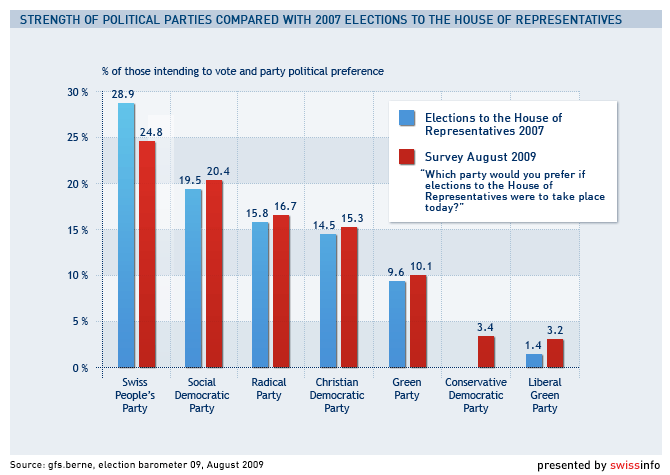
Swiss still attached to consensus politics

The Swiss appear as committed as ever to their traditional political system based on power-sharing and strong personalities in the cabinet.
A survey conducted by a leading research institute also found a majority in favour of extending the role of Swiss president but rejecting plans to choose cabinet ministers in a nationwide election rather than by parliament.
Four out of five respondents approved the idea of cross-party cooperation, while clear majorities also came out in favour of sharing out cabinet seats based on common political aims or on their appreciation of key Swiss values and institutions.
The public showed little interest in fights by the various political parties over cabinet seats, according to the results of the poll published at the parliament midterm and two years ahead of the next elections.
“The debate about the share of votes and the number of seats of a party in parliament does very little for a wider public,” said Claude Longchamp of the gfs.berne research and polling institute.
“What counts is the ability of a politician to cooperate across party political lines.”
A proposal to elect cabinet ministers according to a list of parties willing to cooperate gained 63 per cent support. The current system of electing members individually won the backing of 39 per cent of respondents in the poll.
More than three out of five respondents said the post of Swiss president – a largely ceremonial role rotated on an annual basis among cabinet members – should be extended to a two year period.
Unrealistic
Proposals presented by a group of parliamentarians, political scientists and historians last month to break up the present multi-party system in cabinet appear highly unlikely to win much support.
“Consensus and power-sharing remain the tenets,” said Longchamp. The poll shows distaste for the idea of excluding a major political party from government.
“It appears the Swiss do not tick this way,” said Longchamp.
The proposal launched by Social Democratic parliamentarian Andreas Gross ultimately aims at electing governments based on common policy programmes, possibly sidelining the rightwing.
Gross warned against continuing to ignore fundamental political changes over the past decade and reducing cabinet elections to simple mathematics.
“We can no longer pretend nothing has changed and try to avoid having to tackle important questions now,” he said.
In 2003 the Swiss People’s Party under its controversial figurehead, Christoph Blocher, won a second seat in cabinet, breaking the traditional make-up of the government after nearly 50 years.
The move triggered the creation of a more moderate group while Blocher was unseated four years later.
Less polarisation
Latest figures on the strength of the political parties apparently confirm a move away from a system with the left facing a strong rightwing. Instead there are indications that the political centre has regained some strength.
“The polarisation of the political forces is practically non-existent at the moment. It might have come to an end,” says Longchamp.
The rightwing Swiss People’s Party, which in 2007 came top with nearly 29 per cent of the vote, has slipped most while small centre-right parties made slight gains.
The Greens are seen as shifting to the centre of the political spectrum, according to the gfs institute.
Confidence
The government gets good marks in the survey for its handling of the conflict with the United States over the UBS bank and banking secrecy. Fifty per cent of respondents believe the cabinet acted well or even very well – against 35 per cent who are critical.
The general level of confidence in the government is currently 47 per cent, five per cent up on two years ago.
The level of confidence in the Swiss government has been on the increase since 2004 when it hit rock bottom.
“Despite the crisis this year we are miles away from that low point,” said Longchamp.

More
Consensus politics and power-sharing
The multi-party cabinet is made up of seven ministers who are elected for a four-year term.
Three centre-right parties currently hold four seats – the Radicals have two and the Christian Democrats and the Conservative Democrats have one each.
The centre-left Social Democrats have two seats, while the right-wing Swiss People’s Party is represented with one member.
The cabinet ministers take decisions on a basis of consensus and are not bound by a coalition agreement among their political parties.
The role of the Swiss president is a largely ceremonial one. The post rotates every year among the cabinet ministers according to a system of seniority.
The next elections for a new cabinet are due in December 2011.
The rightwing Swiss People’ Party lost 4.1% compared with election results 2007, mainly due to a lack of mobilisation of its supporters, experts say.
Two small parties could be seen as winners of the poll. The new centre-right Conservative Democratic Party has 3.4% while the centre-right Liberal Greens improved their share of the vote by 1.8% to 3.2%.
The other main parties – the centre-left Social Democrats and the Greens, but also the centre-right Radicals and the Christian Democrats – remained stable with slight increases of between 0.5-0.9%.
The survey was conducted among 2,035 citizens across the country during the second half of August. It was carried out by the gfs.berne research and polling institute on behalf of the swissinfo’s parent company, the Swiss Broadcasting Corporation.

(With input by Armando Mombelli)

In compliance with the JTI standards
More: SWI swissinfo.ch certified by the Journalism Trust Initiative

























You can find an overview of ongoing debates with our journalists here . Please join us!
If you want to start a conversation about a topic raised in this article or want to report factual errors, email us at english@swissinfo.ch.